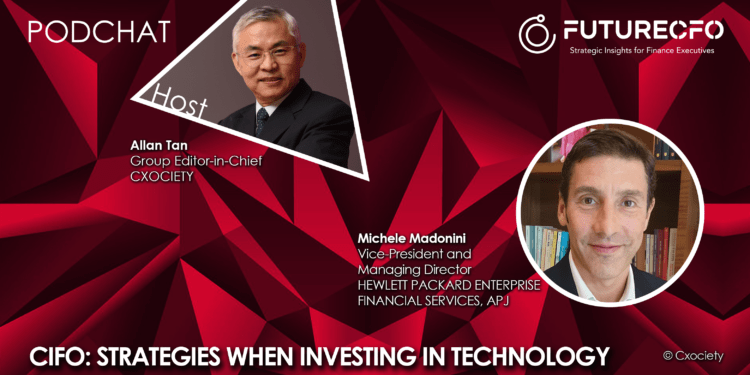In any crisis, survival for some organisations has hinged on how well they optimise their use of capital. Often, in periods of distress companies will hunker down on expenses, and investments, in the name of riding the uncertainties.
What is unique about the COVID-19 crisis is that digital transformation initiatives received a renewed sense of urgency putting even greater pressure on the CFO to understand what investments can deliver the most return to the company’s tactical and strategic goals.
Delivering these urgent digital transformation requirements against the backdrop of short-term financial constraints and long-term fiscal uncertainty is a formidable task that HPE believes requires the insights of a chief information finance officer (CIFO) – combining the expertise of both a CIO and a CFO.
Michele Madonini, vice president and managing director, Hewlett Packard Enterprise (HPE) Financial Services, Asia-Pacific & Japan, suggests that an advisory role, the CIFO, can help companies better plan their investment strategy when it comes to technology acquisition and use.
Just how much influence does, and should, a CFO have when it comes to technology?
Madonini opined that today CFOs need to have a say in the investment strategies of their companies. He commented that information technology (IT) is core to a company’s strategy on how they bring products and services to market.
“The CFO needs to create investment capacity. He or she needs to evaluate the investments based on their return on capital investment. And the CFO needs to be especially nowadays, concentrated on the time to revenue of every investment, the world is changing so fast. The competitive environment is changing so fast, that even the best ROI investment with a long time to revenue, might not be the priority to invest in,” he opined.
He conceded that CFOs need to be involved with the IT strategy, not because they might drive what technology to invest in, but because they need to prioritise. “They need to decide on what's going to give the best return and the fastest return to the company within the limits of the investment capacity that they have,” he continued.
What a CIFO is and is not
Madonini added that the CIFO is not a role that leadership needs to create. He advocated that the role be placed on the third-party vendors they are bringing into the organisation as they map out their technology and investment strategy.
The vendor should not limit their discussions to the CIO because it is a technology project. Instead, he suggested someone who is also able to speak the language of the CFO.
“Our point is to try to find partners that can act as a CIFO advisor, to guide and give proposals and ideas to your IT and finance function to find that common ground, which is there between any function in the C-suite of our customers,” explained Madonini.
Perceived BIAS
Asked whether an HPE Financial Services CIFO would be perceived as having a bias towards HPE solutions, Madonini is quick to assert that most companies have a preferred brand early in their buying journey.
“The only way to create value is to partner in the role of a trusted advisor. It's understanding what the customers want to achieve from a technology perspective, or a product roadmap perspective.”
Michele Madonini
Moving forward
He suggested the role of the CIFO is to understand the constraints of a business from an investment capacity perspective, “and see if we can have a conversation that can help them in merging “this is what I need to do” and “this is how much I have in the piggy bank” to do “what I want to do.”
“Information technology is an investment, and these are assets that you will have or you will consume over time. When it comes to your IT investment and acquisition strategy, it needs to be a full lifecycle approach from the beginning, the usage and the disposal at the end. There are values that you can extract in all the three stages,” Madonini concluded.
Click on the podchat player to listen to Madonini share his thoughts and views on the CIFO in the fulfilment of an organisation’s digital transformation strategy.
- How much influence does the CFO have when it comes to IT strategy?
- What would be the top strategic and top technical benefits of having this CIFO position in an organisation? Is it a formal role?
- Are you advocating that this CIFO be an external entity?
- Do you encounter any objections with regard to the role that you are bringing in this CIFO role?
- As a CIFO, what is your advice to customers as they plan their IT investment strategy?




